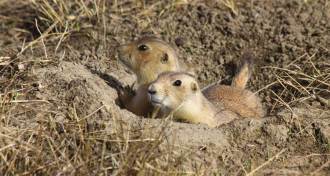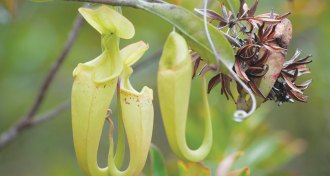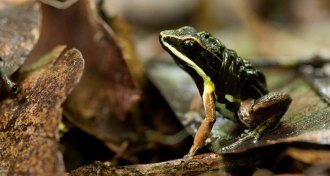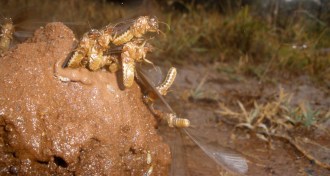All Stories
-
 Astronomy
AstronomyWhite dwarf pair will trigger a supernova — in 700 million years
Astronomers found two white dwarfs with enough mass to explode as a supernova.
-
 Ecosystems
EcosystemsNoise made by humans can be bad news for animals
Animals live in a world of sounds. Clever experiments are finally teasing out how human-made noise can cause dangerous distractions.
By Susan Milius -
 Astronomy
AstronomyFirst stars born later than thought
New results from the Planck mission indicate that the first stars began to shine 550 million years after the Big Bang.
-
 Science & Society
Science & SocietySteven Weinberg looks back at rise of scientific method
Steven Weinberg’s new book ‘To Explain the World’ illustrates the difficulty of the development of modern science.
-
 Animals
Animals‘The Cultural Lives of Whales and Dolphins’ offers window into cetacean societies
Dolphins and whales pass cultural knowledge to one another, the authors of a new book argue.
-
 Animals
AnimalsToads prefer to bound, not hop
The multiple hops made by toads are really a bounding motion similar to movements made by small mammals.
-
 Plants
PlantsFairly bad pitcher traps triumph in the end
Carnivorous pitcher plant traps rarely catch much, but their lackadaisical hunting turns out not to be so lame after all.
By Susan Milius -
 Environment
EnvironmentFunding canceled for clean coal plant
The Department of Energy has scrapped funding for FutureGen, a project to use new technology to sequester carbon dioxide emissions from a coal power plant.
By Beth Mole -
 Environment
EnvironmentFunding canceled for clean coal plant
The Department of Energy has scrapped funding for FutureGen, a project to use new technology to sequester carbon dioxide emissions from a coal power plant.
By Beth Mole -
 Animals
AnimalsRainforest frogs flourish with artificial homes
A rainforest frog population grew by about 50 percent when scientists built pools for tadpoles that mimic puddles made by other animals.
-
 Astronomy
AstronomyAsteroids or planets might trigger a supernova
Rocky debris falling onto a white dwarf might trigger some supernovas.
-
 Ecosystems
EcosystemsTermite mound paradises help buffer dry land against climate change
Landscapes dotted by Africa’s great termite mounds look on the verge of turning into desert but are, in fact, more resilient.
By Susan Milius